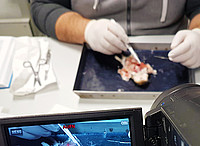The contributions include the personal and individual opinions of students and supervisors. They do not necessarily reflect the opinion of the University of Hohenheim.
“I think I felt like a scientist for the first time here.”

I can remember my first dissection course very well. A little over five years ago, I was sitting in the classroom myself and was a little cheerful for some reason.
The course gave me the chance to observe, touch, and therefore understand at least a little about all the fascinating characteristics of living beings. Finally I didn’t have to just listen and trust that the professor knew what he was talking about. I got to use my own hands and look.
I think I felt like a scientist for the first time here.
We were able to look at many different animal systems. We repeated the basic characteristics and got to know important physiological functions. Who would have thought that an earthworm, which is basically just a tube of skin and muscle with a mouth and anus, would digest in the same way and have comparable organs to a roach, a trout, or even a mouse?
Patterns in the complexity of animal organisms became visible. Here there was space for researching life’s family tree. The close proximity to the instructor and the chance to ask everything related to the organisms gave us a deeper look into the animal side of the living world.
I never lost my fascination for zoology. In the following year I became a student assistant in this course and since then I have supervised dissection courses for Biology and earlier Agricultural Biology almost every semester. I have a lot of fun sharing at least a little of my enthusiasm for this sub-discipline with the following semesters.
In recent years, critical voices have become louder that question the use or necessity of this course, and we take this seriously. But I hope that all critics pause for a moment and think about what this scientific discipline involves before enrolling in a Biology degree program.
Especially zoology looks into the animal word, and this also includes how animal bodies function.
No surgeon learns how an aneurism is clipped by watching Grey’s Anatomy, mechanics take cars apart, and zoologists learn directly about animal anatomy.
I love animals, and I don’t enjoy euthanizing earthworms or roaches for the course. Quite to the contrary. But I do it give the students the same opportunity to learn about anatomy as I had.
And now that I have seen how much effort and organization the course preparation takes, I would say: It’s not only an opportunity, it’s a privilege to be able to attend this course.
The animals are fishing bait, living food, food for humans to eat, and male chicks whose corpses would just be shredded. The instructors fill out request forms and orders. Long distances have to be driven in some cases to pick up “animal byproducts,” and then you have to justify killing the animals to the students.
Dear students, it is good that you have morals and principles and express this, but also think for a moment about the values you and the person you are confronting might share.
We are zoologists, we have at least as much respect for the living beings we research as you do. That is why we try to pass on this respect and understanding of the complexity of the living work with you in this course. And our love for biology and animals is also the reason we try to give the live food, fishing bait, and economically worthless chicks a final, scientific purpose.
If you want to improve the situation of animals, then talk to animal breeding facilities and laying hen factories. If you want to fight global hunger and over-population, study nutritional science or become a politician.
But if you really want to become a biologist... then never lose your curiosity, remain objective, research everything that interests you, and use your head and your hands to do so.
Sabrina, doctoral candidate
